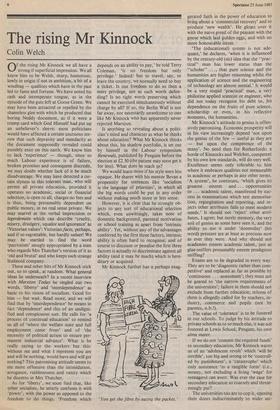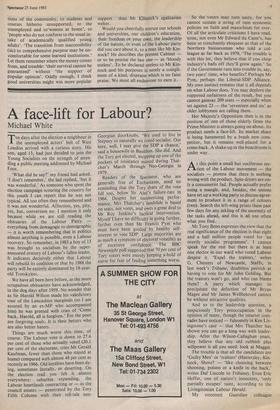The rising Mr Kinnock
Colin Welch
Of the rising Mr Kinnock we all have a strong if superficial impression. We all know him to be Welsh, sharp, humorous, lowly in origin if not in ambition, a bit of a windbag — qualities which have in the past led to fame and fortune. We have noted his rash and intemperate tongue, as in the episode of the guts left at Goose Green. We may have been attracted or repelled by the shameless glee with which he produced that boring Neddy document, as if it were a trump card which God Himself had put up an unbeliever's sleeve: most politicians would have affected a certain unctuous sor- row that such depravity and mendacity as the document supposedly revealed could possibly exist on this earth. We know him to lack 'experience' — though, since so much Labour experience is of failure, broken promises and consequent discredit, we may doubt whether lack of it be much disadvantage. We may have detected a cer- tain slyness in this tolerant man, who will permit all private education, provided it operates no academic, social or financial selection, is open to all, charges no fees and is thus, being presumably dependent on public money, in no real sense private. We may marvel at the verbal imprecision or legerdemain which can describe 'cruelty, misery, drudgery, squalor and ignorance' as 'Victorian values': Victorian facts, perhaps, and if so regrettable, but hardly values! We may be startled to find the word 'patriotism' smugly appropriated by a man who regards Mrs Thatcher's version of it as 'old and brutal' and who keeps such strange Stalinoid company.
These and other bits of Mr Kinnock stick out, so to speak, at random. What general ideas lie underneath? In a recent interview with Marxism Today he singled out two words, 'liberty' and 'interdependence' as basic to his vision of socialism. Good for him — but wait. Read more, and we will find that by 'interdependence' he means in fact 'dependence' and this of an undigni- fied and conspicuous sort. He calls for 'a process of continual education' to remind us all of 'where the welfare state and full employment came from' and of 'the necessity of political action to ensure per- manent industrial advance'. What is he really saying to the workers but this: without me and what I represent you are and will be nothing, would have and will get nothing? This patronising attitude seems to me more offensive than the intimidation, arrogance, ruthlesssness and vanity which he discerns in Mrs Thatcher.
As for 'liberty', we soon find that, like other socialists, he utterly confuses it with 'power', with the power as opposed to the freedom to do things. 'Freedom which depends on an ability to pay,' he told Terry Coleman, 'is no freedom but only privilege.' Indeed: but to travel, say, to leave the country, we normally need to buy a ticket. Is our freedom to do so then a mere privilege, not as such worth defen- ding? Is no right worth preserving which cannot be exercised simultaneously without charge by all? If so, the Berlin Wall is not far away, nor necessarily unwelcome to one like Mr Kinnock who has apparently never rejected Marxism.
Is anything so revealing about a politi- cian's mind and character as what he thinks about education? What Mr Kinnock thinks about this, his shadow portfolio, is set out by himself in the Labour symposium Renewals, published by Penguin before the election at £2.50 (the patient may soon get it for less). What does he teach us?
We would learn more if his style were less opaque. He shares with his mentor Bevan a propensity for sentences like 'socialism is the language of priorities', in which all the big words could be put in any order without making much more or less sense.
However, it is clear that he strongly ob- jects to any sort of educational selection which, even unwittingly, takes note of domestic background, parental motivation or school training as apart from 'intrinsic ability'. Yet, without any of the advantages conferred by the first three factors, intrinsic ability is often hard to recognise; and of course to discount or penalise the first three factors is actually to discriminate against all ability (and it may be much) which is here- ditary or acquired.
Mr Kinnock further has a perhaps exag-
'You get the fibre by eating the packet.'
gerated faith in the power of education to bring about a 'commercial recovery' and to produce 'new wealth'. He gloats over it with the naive greed of the peasant with the goose which laid golden eggs, and with no more honourable intent.
'The (educational) system is not ade- quate,' he declares, 'when it is influenced by the century-old (sic) idea that the "prac- tical" man has lower status than the "scholar" ... , that pure science and the humanities are higher reasoning whilst the application of science and the engineering of technology are almost menial.' It would be a very stupid 'practical' man, a very philistine applied scientist or engineer, who did not today recognise his debt to, his dependence on the fruits of pure science, scholarship or even, in his reflective moments, the humanities.
Mr Kinnock's attitude to genius is offen- sively patronising. Economic prosperity will in his view increasingly depend 'not upon the genius of the few — useful as they are — but upon the competence of the many'. No need then for Rutherfords: a horde of Kinnocks and Welches, competent by his own low standards, will do very well. Excellence seems only tolerable to him where it embraces qualities not measurable in academic or perhaps in any other terms. 'A system', he continues, 'which gives its
greatest esteem and ... opportunities to ... academic talent, manifested by suc- cess in examinations which test memorisa- tion, regurgitation and reporting, and re- jects other attributes fails to meet modern needs.' It should not 'reject' other attri- butes, 1 agree; but surely memory, the very soil of genius as some have seen it, and the ability to use it under 'doomsday' (his word) pressure are at least as precious now as ever they were. And why should not academies esteem academic talent, just as glue-sniffers presumably esteem prodigious sniffing?
Exams are to be degraded in every way. They are to be 'diagnostic rather than com- petitive' and replaced as far as possible by 'continuous ... assessment'; they must not be geared to 'the narrow requirements of the universities'; failure in them should not exclude from further education; reform of them is allegedly called for by teachers, in- dustry, commerce and pupils (not by parents, n.b.!).
The value of 'tolerance' is to be fostered in our schools. To judge by his attitude to private schools as to so much else, it was not fostered at Lewis School, Pengam, his own alma mater.
If we do not 'commit the required funds' to secondary education, Mr Kinnock warns us of an 'adolescent revolt' which 'will be terrible', too big and strong to be 'controll- ed by punishment', a 'catastrophe' which only assistance 'in a tangible form' (i.e., money, not excluding a living 'wage' for teenagers) can avert. Was ever the case for secondary education so coarsely and threat- eningly put?
The universities too are to cop it, opening their doors, indiscriminately to wider sec- tions of the community, to students and courses hitherto unsupported, to the unemployed and to`women at home', to `people who do not conform to the usual in- take of academically qualified young adults'. 'The transition from inaccessibility (sic) to comprehensive purpose may be un- comfortable for some learned institutions.' Let them remember where the money comes from, and tremble: 'their survival cannot be guaranteed' without `the support of popular opinion'. Oddly enough, I think good universities might win more popular support than Mr Kinnock's egalitarian welter.
Would you cheerfully entrust our schools and universities, our children's education, their freedom or your own, the leadership of the nation, or even of the Labour party did you care about it, to a man like Mr Kin- nock? He describes the present Cabinet or to be precise the last one — as 'bloody useless'. To be declared useless to Mr Kin- nock and his purposes is surely a compli- ment of a kind, dispraise which is no faint praise. We must all endeavour to earn it.



















































 Previous page
Previous page